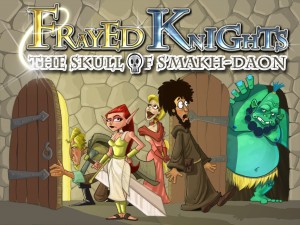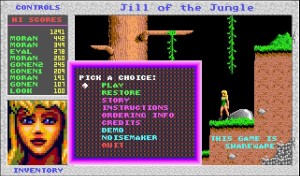Bundles of Trouble
Posted by Rampant Coyote on March 17, 2015
 I’m in a bundle right now – the Indie Royale Mixer 16 Bundle. And it’s ridiculous. I mean… ten games for chump change. The kind of money you find under seat cushions. Like I said earlier, at this point it’s really just marketing for the next Frayed Knights. Get the first game practically free, so you’ll buy the sequel!
I’m in a bundle right now – the Indie Royale Mixer 16 Bundle. And it’s ridiculous. I mean… ten games for chump change. The kind of money you find under seat cushions. Like I said earlier, at this point it’s really just marketing for the next Frayed Knights. Get the first game practically free, so you’ll buy the sequel!
So if I rail against bundles a tiny bit here, realize that I’m happy to admit I’m officially part of the problem. But I’m not really railing against them. I’m actually working to get my brain around them and understand the Brave New World in which we as game producers and consumers live.
Last night, I went a little nuts on a few available bundles, and I picked up what I’d once have considered almost a two-year supply of games. 23 titles, in total. Plus DLC. 23 games. Back in the day, I considered myself lucky if I picked up one game a month, on the average.
But I’d play the crap out of that one game.
Not so much nowadays. When I’m getting games in bulk, I may install less than half of them, and might only get around to playing half of those within the next 12 months. I mean, it’s great – I end up trying games in these bundles that I’d have never taken a chance on otherwise. Sometimes I find some gems. Indies get a pittance from me even if I never play their game.
 The point of these bundles – what it SHOULD be – is marketing. Just like the old days of PC shareware games, where you could get the first episode of Doom or Duke Nukem or Jill of the Jungle for free, and it acted as an extended advertisement for the other games in the series – which usually cost between $15 and $30 a pop. Buy the whole series, and save $10…
The point of these bundles – what it SHOULD be – is marketing. Just like the old days of PC shareware games, where you could get the first episode of Doom or Duke Nukem or Jill of the Jungle for free, and it acted as an extended advertisement for the other games in the series – which usually cost between $15 and $30 a pop. Buy the whole series, and save $10…
In the Real World of marketing, that’s how it’s done (to my knowledge). You do those big discounts to get people in the door. Get people to know who you are, what your product is, and used to you coming around. You get involved in coupon books or whatnot. But unless your product is way overpriced (and no matter what a tiny but vocal group of complainers on the Internet whine about, video games are nowhere near overpriced), you don’t depend on that as your primary source of income. That’s what you do to prime the pump.
I don’t know about all the indie developers out there (not by a longshot — there’s way too many of us now), but it feels like the bundle idea is turning into something else. It’s a quick hit for cash and something of a dumping ground for games. And… is that it?
One of the challenges of the shareware thing in the 90s was that there were soon “too many” shareware titles (dozens and dozens to choose from – kind of adorable by today’s standards). Another, IMHO, was that they really gave too much away. I mean, if you played to the end, sure, you’d hit a cliffhanger and want to play more. But even then, when players like me played the crap out of our much more meager offerings, that was relatively uncommon.
Of course, as a gamer, I really appreciated that. I mean, I played the shareware version of Doom to death long before I forked over the cash for the whole series. More games, more free stuff to play! PC gamers on a limited budget could be pretty satisfied with the wide assortment of shareware episodes available.
I find that pretty analogous to our situation today. As game developers, we need to find a way to leverage the steep-discount mentality that’s taking over these days and use them for more than just a dumping ground to squeeze a few hundred dollars out of our titles. I guess the “freemium” marketplace is exactly that mentality – going back to giving away the game for free as an attempt to up-sell paid content to the user.
We indie developers just need to get smarter about it.
Filed Under: Game Development, Indie Evangelism - Comments: 6 Comments to Read
Dave Toulouse said,
As a dev bundles for me are simple: It’s that or no money.
Not for all my games at any time though. But the thing is if I don’t put Bret Airborne in a bundle then this game released in 2013 doesn’t make me any money now.
Human Extinction Simulator might also come to that point but so far it’s still selling a bit so I won’t put it in a bundle just yet.
I used to be concerned about bundles and deep discounts but I find it more productive to think about what kind of game I can try to make next to hopefully not have to rely to such strategy to make money.
I wish I could really “help” things by stopping to put Bret Airborne in bundles but to be frank these few thousands dollars I make through bundles really are helpful considering the other option is to make a big $0 …
I for one am not ready to say something like “stop waiting for a discount on Bret Airborne, I will never put it in any bundle and will never lower the price”. I don’t think it would suddenly raise my sales.
Rampant Coyote said,
Okay – but let me ask you one question:
When you start / play / exit Bret Airborne (the bundle version)… does it encourage you to try other games at your site? Does it have an ad for HES?
Rampant Coyote said,
I guess that was kinda two questions, but the same idea.
Jack said,
Using it for marketing is certainly the smartest way. That’s also how it works with eBooks. Offer the first part of a series at a discount or even for free, and maybe it’ll raise awareness and sell more of the rest of the series.
But there are also games that I would never buy at full price, maybe because it’s not appealing enough or because the price is way too high for what it offers. Like $8 for a game that you can finish in 30 minutes. Doesn’t really matter how good the game turns out to be.
And some devs don’t have a choice but to dump their games into bundles, because no one else would buy the otherwise. Which might be due to a lack of marketing or because the game is simply that bad, like The Slaughtering Grounds, which would actually dissuade me from buying the bundle as I wouldn’t want the dev to get any money for something like that.
Rampant Coyote said,
Oh, I absolutely agree. But I never did believe in the “one price fits all” model, anyway.
Dave Toulouse said,
It indeed doesn’t have an ad pointing to HES. It’s something I fixed in HES itself but didn’t thought to make the change for Bret Airborne.